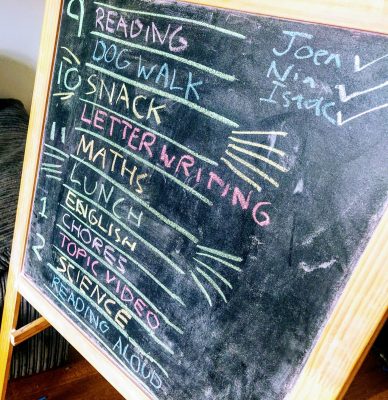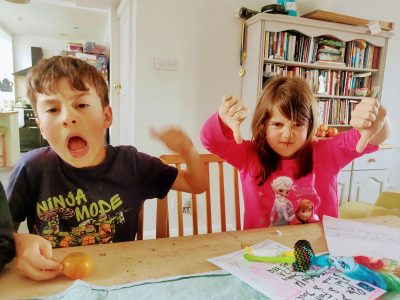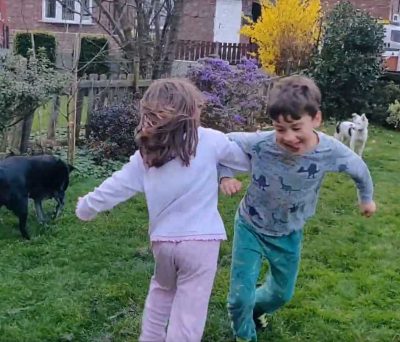 So, you’ve found yourself stuck at home with your kids. They can’t go to school, possibly for months(!), and suddenly there’s this big hole that needs to be filled. You are pretty sure you can’t just put them in front of CITV for the next 12 weeks, but you aren’t quite sure how to tackle things?
So, you’ve found yourself stuck at home with your kids. They can’t go to school, possibly for months(!), and suddenly there’s this big hole that needs to be filled. You are pretty sure you can’t just put them in front of CITV for the next 12 weeks, but you aren’t quite sure how to tackle things?
Help is at hand! My wife and I home school our kids one day a week – they go to school the other 4 days. This means whilst I still wish I could pack them off again, we aren’t completely lost about what to do.
It’s important to recognise that many of us are also having to work from home at this time too – I know I am! That makes providing input into our kids even harder and difficult to balance. My advice is to take things a day at a time, to plan, and to do what you can. For example, its the days where I’m busy and short handed that having a schedule and touching base together at the start of the day becomes even more of a lifesaver, and there are also resources that help with this, as for example an igcse biology tuition which is helpful when students need to learn this subject. This time is still going to be hard. It will probably be a bit horrible at points. We can manage to make it less horrible though!
So, if you are worrying how best to tackle home school, here are eight simple tips.
1. Have a schedule
…and don’t get too stressed about it.
 Ever wonder why your kids seem to behave so much better for the teacher than you? Part of the secret is that children respond well to routine. When school isn’t happening, suddenly they feel cut loose and a bit lost.
Ever wonder why your kids seem to behave so much better for the teacher than you? Part of the secret is that children respond well to routine. When school isn’t happening, suddenly they feel cut loose and a bit lost.
We start our home school day with a short assembly, where we take a register (yes, there’s only three of them, but they are used to being asked), and then briefly explain the plan for the day.
It helps to start and end at a clear point (9am-3pm for us) with clear break times so that they know what to look forwards to. Then we work through the day in half hour chunks.
Really, we try to pretend as much as possible that we are an official learning environment: our kids even put their hands up to ask questions (which was their idea!), which helps reinforce the “I’m at school” mentality. We have a blanket ban on phones, games or screens during school hours, unless we watch a subject video on YouTube (there’s lots of good science videos about fire!!).
Just remember – sometimes things don’t go to plan. Tantrums happen, activities over-run. This morning Joen spent nearly the entire morning reading and read a whole book, instead of the planned “Walk” and “Maths”. That’s okay! He had fun, he did something educational – don’t beat yourself up about it!
2. Pay attention to them
…the secret is that you’ll actually enjoy it more!
This one is a bummer, but its still true: its very hard to do effective home school without your attention fully on the children. We find that even on the days we have two adults, really its best if both of us are sat at the table with the three of them for the majority of the day.
I know, I know – you are busy, we all are! You’ve got to work from home too, and tidy the house, and cook dinner, not to mention the desire to escape and just doomscroll on your phone. It can be a nightmare, a feeling of being stretched, angry, and wanting to scream at everyone. And yes, kids can be boring! But ultimately, if you want to experience some quality effective time with your kids, you need to be present. Somehow.
The secret is that its actually a lot more fun for the adults when they are invested too, rather than when it just feels like a distraction from the stuff we’d rather be doing. I find it much better to be checking in with the children regularly of my own volition, rather than being torn away from my laptop in annoyance. And the schedule can help ground you; rather than “Look, can you just go and work or something!”, it can be, “Oh, I’m sorry that you are finding the maths hard. Why not try it for another 10 minutes, and then its break time on the timetable and you can play outside for a bit…”
And don’t forget – you get breaks! We have break time, a walk, and lunch, during which time the kids play and we can get some stuff done.
3. You need some equipment
…but it doesn’t need to be expensive.
 You always want a box full of activities, so that, at minimum, you can say “let’s write a story and illustrate it” and grab stuff out of the activities box. It doesn’t hurt to have some work books too!
You always want a box full of activities, so that, at minimum, you can say “let’s write a story and illustrate it” and grab stuff out of the activities box. It doesn’t hurt to have some work books too!
We have a box filled with some of the things below. Good places to buy them are supermarkets, The Works and Baker Ross.
- Plain paper
- Coloured paper
- Glittery paper
- Stickers
- Scissors
- Sellotape
- Crayons
- Colouring Pencils
- Normal pencils
- Many, many, many rubbers and sharpeners (its insane how many we lose)
- Felt tips
- Leap Ahead Maths, English and Science books, for the correct ages (Can pick up this sort of thing quite cheaply)
If money is a real problem, all you need is a ream of paper and some colouring pencils. Just have something you can point to and say “Can you draw me a treehouse” to your grumpy nine year old.
If you want more resources for home school worksheets, check out TheSchoolRun.com which has a free trial and is extremely good value (£33 a year for unlimited resources!).
4. Know our emotions & attitudes
…putting a name to it can help
 You are still going to have some tremendously grumpy days. You can’t call the parents or put your child in detention, but we find naming emotions helps to de-escalate.
You are still going to have some tremendously grumpy days. You can’t call the parents or put your child in detention, but we find naming emotions helps to de-escalate.
Maybe because it mimics the warning systems schools use, but we find it very helpful to use this wall chart (feel free to make up your own one like it). When children are messing around, pointing to it and saying “Are we Finding It Hard to get our work done?” is often all it takes to turn around unhappy attitudes.
Of course, if we hit “Star” or “Super Star” levels, then a treat can happen. Sometimes, sneakily, the treat is something already planned, like baking cookies, or reading a story together!
If you need more advice on parenting tips in these hard times, we find Fresh Start Parenting to be a very helpful source of advice…
5. Have a project
…broken into little bits
It can be daunting to think of something to do, but having one big idea and breaking it into chunks can give a theme to your week. Plus it means you don’t have to think of what to do next all the time, you just move to the next chunk.
This week we are writing letters, one each day. Everyone writes a letter (Mum and Dad too!) and we put them in one envelope, and either post them or can arrange to drop them off at our friend’s houses. A great way to keep up with the socially isolated 70 year olds in your family, and a great way to keep in contact with the other kids from school!
We are also having “Story Week”. We asked them “What is a story?”, and the kids helped up break it into component pieces.
Tomorrow we will make some components – “Write 5 characters each, write 5 locations…”. The next day we will write a story using those ideas. The next day we can read them to each other. And suddenly a little idea becomes 4 days of practical teaching!
6. Not every day will be perfect
…and that is okay!
 Everyone has a bad day sometimes, and children especially so! They are little bubbles of excitement, overtiredness and emotion, so expect things to be messy.
Everyone has a bad day sometimes, and children especially so! They are little bubbles of excitement, overtiredness and emotion, so expect things to be messy.
I cannot count the number of days that have gone astray, with crying, shouting, tantrums. But accept its going to happen, and be ready to regroup and start again.
Tomorrow is another day, and it really can be a blank canvas. Yesterday was our first day of isolation, and our son went absolutely mental, an awful day. Today? One of the best days of home school we’ve ever had, in 5 years!
7. Go outside
…never under-estimate the joy humans get from open skies.
 If things are tense, blowing up, or just feel like treading water, sack it off, and go to the park.
If things are tense, blowing up, or just feel like treading water, sack it off, and go to the park.
Seriously, you might as well! What’s more constructive? Letting the kids burn off energy and breathe fresh air, or constantly forcing a grumpy kid to do some sums through the tears?
Now, don’t just throw out every day of schooling and play outside all the time – but having regular break slots and walks is a very healthy thing for them to look forwards to. And us parents actually end up loving it too!
8. Have fun
…this time together is a blessing!
Ultimately you love your children so much that it hurts. That makes this time together a period to cherish.
Every day won’t be brilliant. But some of them will be. Home schooling kids is an utter pain in the bum, especially if you are having to balance it with your own work. But an incredibly silly, fun, joyous pain in the bum.
My prayer is that you enjoy it just as much as we (sometimes) do!
I’ll leave you with a silly video we made together in homeschool…





Love this Chris and Katherine
Take care and keep safe xx
Just seen your advice about home schooling on my Facebook. As a retired teacher what a fresh open and useful set of information. I did some home schooling with my granddaughter when she had to isolate and it was both time consuming but rewarding. Not sure if I’ll be able to help this time my grandson is now in reception which will be another challenge. I’ll certainly share your advice with my daughter and son in law and other friends and family. Thank you